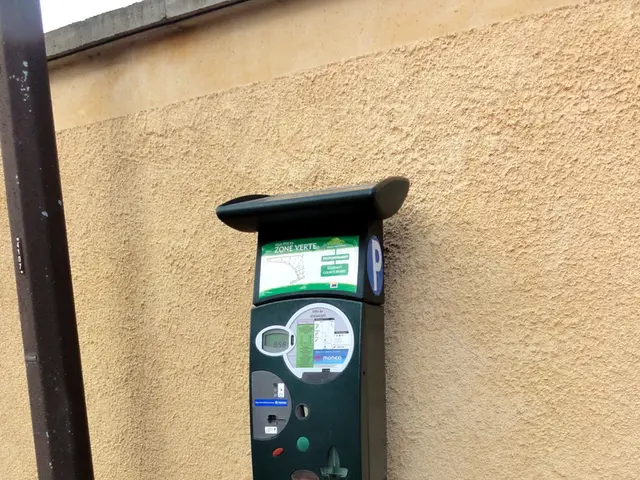Beating the Blues: Sven Matthiesen on the Resilience of Bank Branches and Snagging Talent
Frankfurter Streets by Tobias Fischer, Frankfurt
"We maintain a stronger edge due to our superior resources"
Navigating the job market is a hurdle for many companies in the financial sector, and Frankfurt Sparkasse is no exception. With a worker exodus on the horizon, this venerable institution is pulling out all the stops to keep their retail division in the black. From lateral entry programs to Instagram, they're leaving no stone unturned in their quest for fresh blood.
With retirement waves set to claim around 70 to 80 employees annually, Frankfurt Sparkasse isn't shy about scouring both conventional and unconventional avenues for reinforcements. Sven Matthiesen, board member responsible for the private customer area, is well aware of the impending personnel crunch. "By 2030, we're looking at 20 to 30 departures each year," he warns. In an interview with the Börsen-Zeitung, he also addresses another looming issue: a scarcity of service staff, who are vital in keeping the branches open and able to serve customers.
When it comes to staffing gaps, Matthiesen sees the private customer advisor position as the biggest challenge. To tackle this, the Sparkasse has implemented a variety of strategies. Alongside retraining existing employees, they've created a lateral entry program for commercial professionals, aiming to bring fresh perspectives into the fold. This initiative also targets students of various disciplines—from retail management to hotel studies—providing them with nine months of training to learn the banking ropes.
In addition, Frankfurt Sparkasse is accommodating a shift in training requirements, welcoming Realschule graduates and scaling down the previous demands. The bank's efforts have proven fruitful, with more applicants than ever before and most positions filled, a rarity in today's competitive market.
But when it comes to external talent, what about those already working in the industry? Matthiesen observes a perceived "wall" between Sparkassen and large private banks, suggesting that personnel is less likely to hop the fence from larger financial institutions to these savings banks.
Despite these challenges, the future looks bright for Frankfurt Sparkasse, which stands out as one of the largest bank trainers at the Frankfurt banking hub. To attract even more young blood, the institution is willing to make concessions, backed by a dedicated social media team that's making waves on TikTok, Instagram, and other platforms.
When asked about the impact of dwindling branch numbers on staffing, Matthiesen acknowledges the real estate ramifications. With the current 41 branches, however, he remains confident that the branches still serve their purpose—fostering customer acquisition and retention. In fact, the bank added around 7,000 checking accounts last year, bringing their total to over 312,000, excluding their subsidiary 1822direkt.
Frankfurt Sparkasse derives a significant portion of its customer base from those who avoid online banking, with around one in five customers not having an online banking contract and another 10% having one but not using it. This presents both a challenge and an opportunity for Matthiesen and his team, as they continue to adapt to the evolving banking landscape and attract a tech-savvy workforce.
In an increasingly digital world, these branch institutions serve as indicators of the economic vitality of the neighborhoods in which they reside. For Matthiesen, the closure of a bank branch can foretell the end of the economic viability of the surrounding area, and he's seen it play out in neighborhoods from which the Frankfurt savings bank has withdrawn. Gone are the DMs and Rossmann, leaving behind a ghost town of sorts.
Sven Matthiesen returned to Frankfurt Sparkasse in August 2020, taking the helm of the retail business after a brief stint at Helaba. A graduate economist who started his career as a bank trainee, Matthiesen's experience spans various aspects of the German banking industry, from working at the state bank of Schleswig-Holstein and the German Savings and Giro Association (DSGV), to serving as head of Retail at Frankfurt Sparkasse from 2005 to 2015.
As the financial sector grapples with the looming staff shortage, innovative solutions like Frankfurt Sparkasse's lateral entry programs, training initiatives, and digital outreach are paving the way for the banks of tomorrow.
In light of the upcoming staff shortage, Frankfurt Sparkasse is actively exploring both traditional and unconventional avenues to recruit new employees, particularly for the private customer advisor position. This includes implementing lateral entry programs for commercial professionals, as well as training students from various disciplines to learn the banking ropes.
Expanding its efforts to attract external talent, Frankfurt Sparkasse is leveraging social media platforms like TikTok and Instagram to boost its online presence, aiming to appeal to a tech-savvy workforce in the banking and finance industry.







